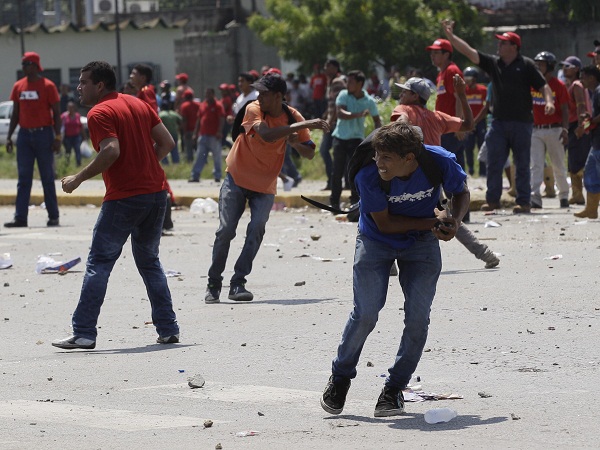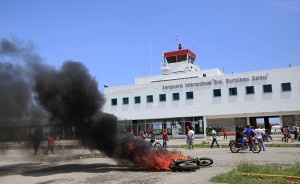Violence breaks out at Venezuela campaign event

Supporters of Venezuela’s President Hugo Chavez hurl stones at supporters of opposition candidate Henrique Capriles, who were hurling stones back, outside the International airport in Puerto Cabello, Venezuela, Wednesday, September 12, 2012. Violence broke out at the opposition campaign event as Chavez supporters blocked a road and a campaign truck was torched. AP/Ariana Cubillos
PUERTO CABELLO, Venezuela–Violence erupted at an opposition campaign event Wednesday as supporters of Venezuelan President Hugo Chavez blocked a road and a campaign truck was torched. Both sides hurled rocks, and police said at least 14 people were hurt.
A large crowd of Chavez supporters in red shirts blocked a main road near the airport in the coastal town of Puerto Cabello before a visit by opposition candidate Henrique Capriles. A truck used by Capriles’ campaign was set ablaze, and a motorcycle was also torched.
Capriles had been scheduled to visit an area that has traditionally leaned pro-Chavez, and opposition supporters were seen running to take cover during the violence.
At least 14 people suffered cuts and other minor injuries, police in Carabobo state said.
After the violence, Capriles spoke at an outdoor rally in the town, blaming Chavez and small “radical groups.”
Article continues after this advertisement“Those actions aren’t spontaneous. There’s someone responsible for those actions,” Capriles told the crowd. Addressing Chavez without mentioning the president’s name, Capriles said: “It’s you who wants that scenario. It’s you who wants to sow fear.”
Article continues after this advertisement“We know that he who turns to violence, it’s that he’s afraid of the other’s ideas,” Capriles added. “We’re tired of violence.”

A motorcycle burns outside the International airport during clashes in Puerto Cabello, Venezuela, Wednesday, September 12, 2012. Violence broke out before an opposition campaign event got started, between supporters of opposition presidential candidate Henrique Capriles and supporters President Hugo Chavez. Tensions have sporadically erupted into violent clashes and scuffles between supporters of the two candidates ahead of the October 7 presidential vote. AP/Ariana Cubillos
His supporters chanted, “We aren’t afraid!” Capriles had been on his way to the event when the clashes erupted, and to bypass the blocked road he traveled by helicopter to a spot where fishermen took him by a motorboat to the area.
Chavez has recently said his rival has a hidden agenda to impose right-wing measures “that would lead Venezuela to a civil war.” But Chavez has denied intending that as a threat or trying to promote violence in any way.
During the melee, some of the red-shirted government supporters went into the airport compound and carried away speakers and a generator.
A station wagon filled with Capriles’ campaign fliers also was trashed as people broke the windows, ripped out the headlights and began to pull out parts from under the hood. The campaign fliers were left scattered on the ground.
Carabobo state Gov. Henrique Salas Feo, a Chavez opponent, condemned the violence on television saying, “The country needs peace.”
National Guard troops arrived at the airport afterward.
Tensions have sporadically unleashed violent clashes and scuffles between supporters of the two candidates ahead of the Oct. 7 presidential vote, in which Chavez is seeking another six-year term.
National Electoral Council president Tibisay Lucena condemned the violence, saying it appeared to have been provoked by a group of people. She didn’t lay blame on either political camp.
Jorge Rodriguez,Chavez’s campaign manager, blamed government opponents and said the Carabobo police, which are under Salas’ command,attacked Chavez’s partisans.
Rodriguez said government supporters “have a right to protest and demonstrate freely” against Capriles’ visit.
“The police arrived and savagely attacked the people,” Rodriguez said on television, adding that Chavez’s campaign has photos of Carabobo police officers in civilian clothing participating in the violence.
Kelvis Olleda, a 15-year-old Chavez supporter, blamed the opposition for provoking the incident.
“They started this. They were looking for us,” Olleda said, holding a stick as he joined the pro-Chavez crowd.
Endris Quintero, a Capriles supporter, stood watching as people threw rocks. “It isn’t fair,” he said. “It’s an act of vandalism.”
Jaime Castillo, a criminologist watching the clashes, called the violence serious. “The government has led us to confrontation,” said Castillo. He said that local government officials had put out calls on Twitter and radio for Chavez supporters to take to the streets.
He also blamed National Guard troops for not acting immediately, even though troops were stationed at a post right next to the area.
In previous incidents during the campaign, four people were injured in a shooting that erupted during a voting drill earlier this month.
In July, stone-throwing Chavez supporters clashed with opposition sympathizers who joined Capriles as he led a march in a poor Caracas neighborhood.
In another incident on March 4, gunfire rang out while Capriles was visiting a traditionally pro-Chavez neighborhood in Caracas, injuring one supporter of the opposition leader.
Wednesday’s violence occurred just as former Patrick Duddy, a former U.S. ambassador to Venezuela, said in a report released this week that in the coming months Venezuela “could experience significant political unrest and violence that lead to the further curtailment of democracy in the country.”
In the report, which was published by the Council on Foreign Relations, Duddy wrote that while Chavez has said he will respect the result of the vote, “most plausible scenarios for instability and conflict in Venezuela derive from the premise that the Chavistas will not willingly surrender power and would be willing to provoke violence, orchestrate civil unrest, or engage in various forms of armed resistance to avoid doing so.”